
In a world where volatility is the new normal, extractive industries find themselves at a critical crossroads. There are both opportunities and challenges for the EITI as it seeks to fulfil its mission to improve extractive sector governance.
While demand for transition minerals continues to grow exponentially, the sector is affected by price volatility and uncertainty. The COP28 agreement signalled decisive shifts for energy systems, with over 120 countries committing to tripling renewable energy capacity by 2030. These commitments will further shape developments in the extractive sectors, driving continued demand for transition minerals and the prospect of longer-term decline in fossil fuel production and use.
At the same time, many parts of the world are still experiencing significant conflict and insecurity, diminishing trust in governments and institutions. Civic space is under threat in many countries, hindering citizens' ability to hold their governments accountable. The rise of artificial intelligence also poses new challenges, risking a proliferation of misinformation as an unprecedented number of citizens head to the polls in 2024, but also offers fresh opportunities to share and analyse open data at scale.
In such times, the imperative for transparent and accountable management of natural resources has never been clearer.
As shifting dynamics affect local economies and livelihoods, we must redouble our efforts to ensure responsible stewardship of finite natural resources, guarding against corruption and the misuse of resource wealth. Transparency and accountability mechanisms are paramount in supporting this effort, especially for the EITI with its focus on using data and dialogue to ensure sustainable revenue generation and to counter corruption.
Against this backdrop of change, the EITI remains unwavering in its commitment to transparency, accountability, and multi-stakeholder engagement. I extend my deepest gratitude to our partners, stakeholders, and the entire EITI community for their steadfast support and dedication. Together, we will continue to champion open, accountable, and constructive dialogue on natural resource management, driving positive change for the benefit of all.
Rt Hon. Helen Clark
EITI Board Chair

In 2023 we celebrated two decades since the inception of the EITI and introduced an updated EITI Standard, marking a significant milestone in our journey in pursuit of our mission to ensure natural resource wealth is used for the benefit of a country’s citizens. This period also provided us with a chance to reflect and plan strategically, focusing on priorities such as domestic revenue mobilisation and anti-corruption amid the ongoing energy transition.
The shift to a low-carbon economy presents a unique opportunity. While mining remains vital in supporting renewable energy, we must learn from mistakes of the past and remain vigilant to mitigate potential social and environmental risks. For oil and gas-producing nations, the implications of this transition are profound. As consumers move away from fossil fuels, transparency and accountability in natural resources management are imperative, and there is growing interest in applying country lessons from the EITI’s work to the renewable energy sector. The stories in this report reflect the collective efforts at the national and international levels to navigate this transformative period.
The 2023 EITI Standard guides our efforts by providing a framework for transparency and accountability. It enables us to address emerging challenges and capitalise on new opportunities.
At the EITI, we strive to empower citizens to benefit from their natural resources. As countries embrace the opportunities of the energy transition, it will be essential that they ensure equitable distribution of benefits and mitigate risks. Through robust subnational and community engagement, the EITI fosters inclusive dialogue and decision-making processes.
Looking ahead, our focus remains on supporting countries through capacity building and peer learning. We will scale up our efforts to publish information from government and companies, enabling citizens and decision-makers to access EITI data. With Validations under the 2023 EITI Standard due to begin in 2025, we are committed to equipping countries implementing the EITI Standard with the necessary tools and knowledge to meet our shared ambition. As we refine our strategic priorities and develop our three-year outlook, we are proactively anticipating future trends and challenges to ensure the continued relevance and impact of the EITI in the years ahead.
Mark Robinson
EITI Executive Director

01 The year in review
2023 was a milestone year for the EITI. Marking twenty years since it was first established, the EITI’s anniversary provided an opportunity for our community to reflect on the organisation’s journey, celebrate progress and raise the bar for extractive sector transparency worldwide with the new 2023 EITI Standard.
2023 at a glance
Global implementation and progress
Assessing progress in meeting the EITI Standard
The EITI holds all implementing countries to the same global standard. Through Validation, the EITI’s quality assurance mechanism, countries are assessed on their progress in implementing the requirements of the EITI Standard.
In June, the EITI Board launched the 2023 EITI Standard, which contains strengthened provisions and reporting requirements, especially on anti-corruption and the energy transition. The International Secretariat is prioritising capacity among countries on implementing the new provisions. Validations against the 2023 EITI Standard will begin in January 2025.
In 2023, the EITI Board evaluated 11 countries, highlighting key advancements and opportunities to strengthen sector transparency, stakeholder engagement and impact of EITI implementation.
Validations conducted in 2023
Burkina Faso
Moderate (75.5 points) | November 2023
Amid challenges such as military takeovers, national security concerns and COVID-19, Burkina Faso has used EITI implementation to disclose detailed information on large-scale mining and to investigate the gender dimensions of mining activities. However, challenges persist in public oversight of how community development funds are used, and there are gaps in disclosures on the country's artisanal and small-scale mining sector.
Colombia
Moderate (80 points) | June 2023
EITI implementation in Colombia has driven reforms on benefit sharing, including improvements on how revenues are shared at the subnational level and a new law to monitor and control the investments funded by these transfers. Moving forward, Colombia should establish a regulatory framework that enables beneficial ownership disclosure, which could be further incorporated into licensing processes.
Côte d’Ivoire
Moderate (80.5 points) | April 2023
Leveraging EITI implementation, Côte d'Ivoire has disclosed key oil and gas contracts and provided data on its important electricity swap agreement. The country has also enhanced reporting on licenses, beneficial owners and mining local development funds. Opportunities for the EITI in Côte d’Ivoire include overcoming challenges in multi-stakeholder oversight and addressing corruption cases, which could strengthen its role as a credible platform for extractive sector dialogue and data.
Dominican Republic
Moderate (83.5 points) | November 2023
EITI implementation in the Dominican Republic has strengthened transparency through extensive reporting on mining revenues, which could be used to track subnational transfers and benefit sharing. While the country has excelled in transparent practices for contracts and licenses, it has been urged to extend this approach to beneficial ownership disclosure. Establishing a robust legal framework could help institutionalise comprehensive data collection and publication.
Mozambique
Moderate (82.5) | Jun 2023
The EITI process in Mozambique has helped identify weaknesses in revenue allocations to host communities, resulting in a reform of the rules governing these transfers. It has also contributed to contract disclosure and to transparency of state-owned enterprises. Opportunities remain to publish beneficial ownership information and disclose data in open format.
Nigeria
Moderate (72 points) | November 2023
Nigeria EITI (NEITI) has upheld robust disclosures, which inform extensive debate. It also launched a public beneficial ownership register and the government has used ownership data to assess oil, gas and mining license applications. Opportunities remain to strengthen disclosures by the national oil company, NNPC, and to make progress on contracts disclosures. The country also needs to strengthen multi-stakeholder oversight of EITI implementation and NEITI.
Norway
High (87.5 points) | April 2023
Norway is a leader in providing timely, systematic disclosures of energy and extractives data, primarily through an online portal. Extensive license and contract disclosures enable public debate on resource governance. However, ensuring universal publication of company payments to government remains an area for improvement. Norway’s forthcoming beneficial ownership register promises further enhancement of transparency. Leveraging the EITI framework can bolster comprehensive disclosures, particularly as the mining sector expands.
Republic of the Congo
Moderate (70.5 points) | March 2023
EITI implementation in the Republic of the Congo has strengthened public oversight of oil revenue management through comprehensive contract disclosures and financial data of its state-owned enterprise, SNPC. EITI disclosures were used to assess the country’s fiscal regime and provide a forecast of future revenues for specific petroleum projects and analyse oil sales. There are opportunities to improve multi-stakeholder dialogue and disclosures on commodity trading and beneficial ownership.
Tanzania
Moderate (77 points) | November 2023
Tanzania’s EITI disclosures are used by the country’s audit institutions to monitor the management of extractive sector revenues. These disclosures encompass cost-related data for both extractive companies and industry service companies. The government also provides extensive information on mining revenues, licenses, production and exports. Tanzania EITI has taken steps to share information with mining communities regarding payments made at the subnational level. However, contracts and beneficial ownership information are not publicly available, despite legal provisions mandating disclosure.
Timor-Leste
Fairly low (58 points) | April 2023
Timor-Leste has maintained routine disclosure of extractive sector data and expanded EITI reporting to cover sub-contractors in the oil and gas industry, a topic of public interest. EITI disclosures have been used to shed light on the management of the country’s petroleum fund. However, stakeholder engagement and impact of EITI implementation have been limited, resulting in a fairly low score.
Trinidad and Tobago
High (89 points) | March 2023
Trinidad and Tobago's advancements in EITI implementation have enriched public discourse on the country’s oil, gas and quarrying sectors, supported by an online EITI portal and innovative communication strategies. To bolster transparency and guide policy amidst shifting energy dynamics, the country is urged to remove tax and contract confidentiality barriers and improve routine disclosures.

02 Advancing our strategic priorities
The EITI’s 2021-2023 strategic priorities have sought to respond to global challenges and priorities concerning natural resource governance, and to reflect the diverse challenges faced by resource-rich countries as they tackle national priorities and reforms through implementation of the EITI.
Covering six areas, the framework has guided the EITI’s work to ensure that implementation continues to be relevant, responsive and cost-effective. In light of an evolving context, the strategic priorities will be updated in 2024.
New provisions support disclosures and public debate on the economic and governance impacts of the energy transition. New disclosures will shed light on relevant policies, revenue implications of changing market conditions, corruption risks in fast-tracked license awards, impacts on communities and greenhouse gas emissions. These are covered by EITI Requirements 1.5, 2.1, 2.2, 2.6, 3.1, 3.4, 5.3 and 7.1.
Transition Minerals Network
In December 2023, the EITI convened the Transition Minerals Network, launched in June, bringing together more than 50 representatives from over 15 EITI countries to share information on strategies for embedding transparency and accountability along the value chain as countries seek to increase value addition on transition minerals.
The initiative builds on the EITI’s research and recommendations, providing a forum for peer learning on legal and policy developments, challenges and good practices in the transition mineral sector. For instance, Zambia’s Green Minerals Strategy and Indonesia’s Critical Mineral Regulation were highlighted as examples of pathways that countries are adopting, sparking discussions on how the EITI platform can support such policies through improved transparency, accountability and equitable distribution of sector benefits.
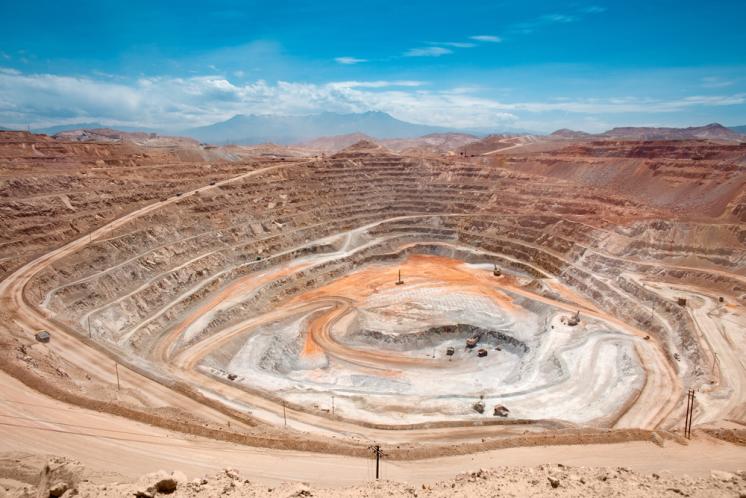
Transition Minerals Network
- 15
- EITI implementing countries are major producers of minerals used for energy transition technologies.
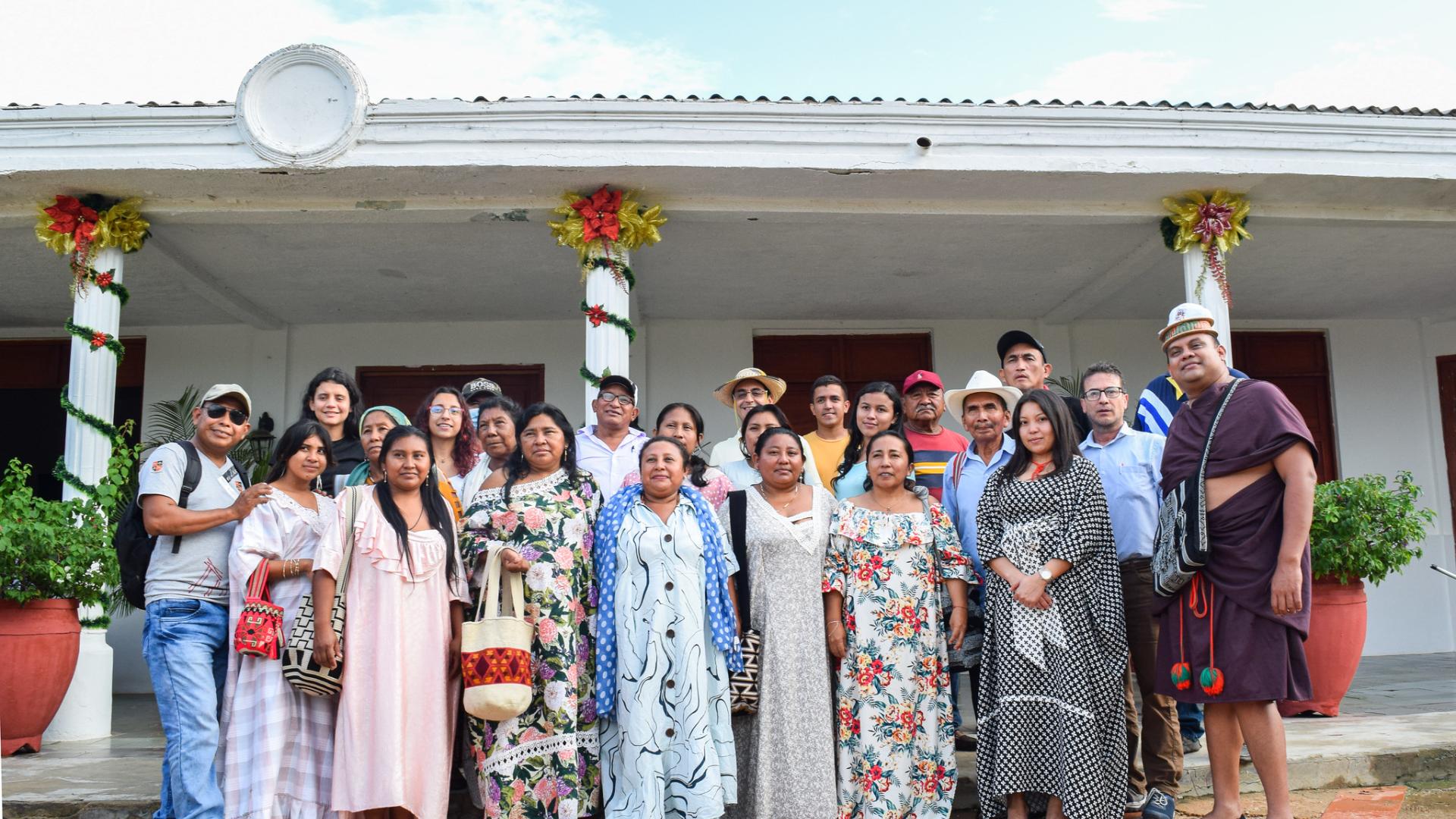
Engaging communities in a just transition
The EITI’s “Engaging communities in a just transition” project, initiated in 2022 with support from the Ford Foundation, addresses the overlooked impacts of the global energy transition on local communities. Implemented in four communities in Colombia, Ghana and Indonesia, the two-year project explored how the energy transition affects local livelihoods and ways of life, while also aiming to enhance community participation in decision-making processes related to the transition.
In October 2023, the EITI published a global report outlining key learnings from the project. The findings highlighted a disparity between the information and engagement requirements of communities and the current systems in place to support their participation in energy transition policies, which could potentially affect their livelihoods. The report also highlights the need to sustain local community engagement in the long term and offers recommendations to address these challenges.
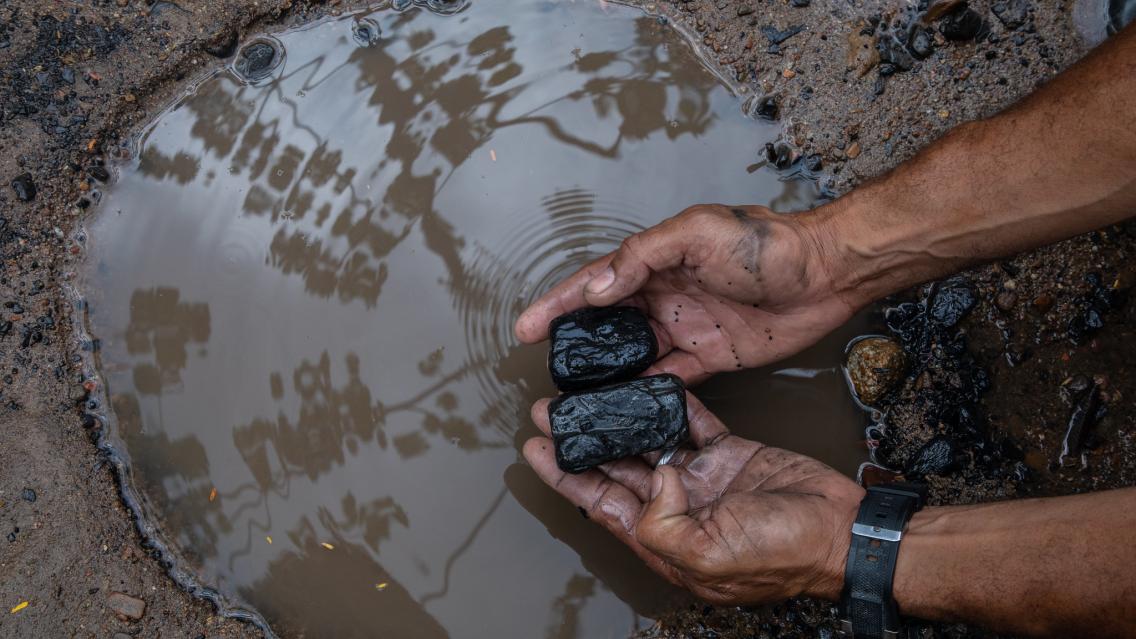
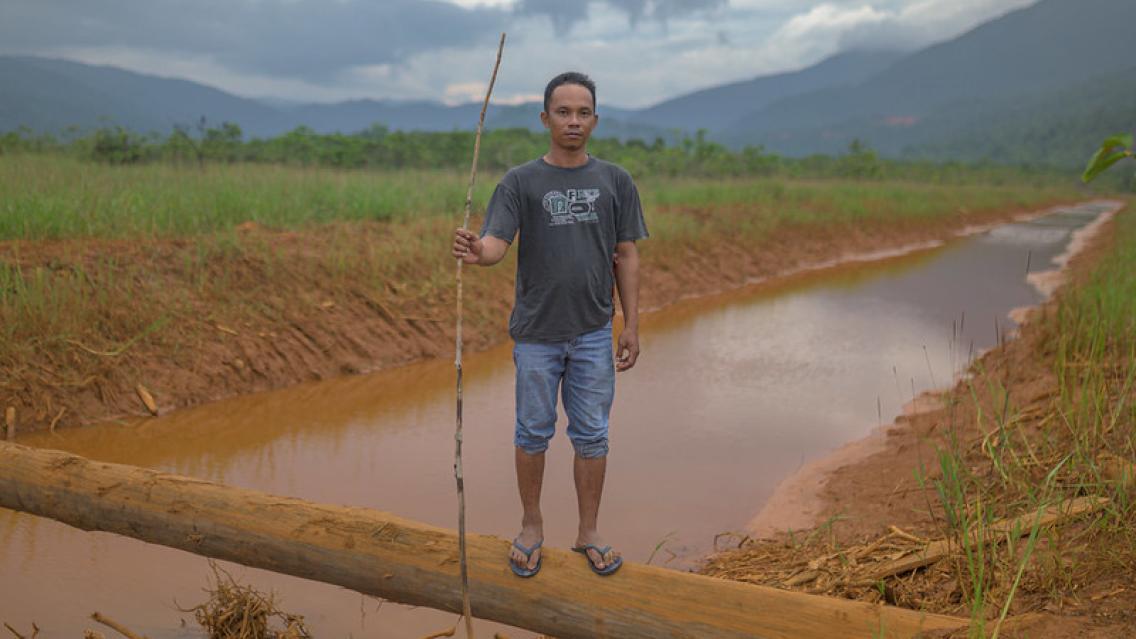
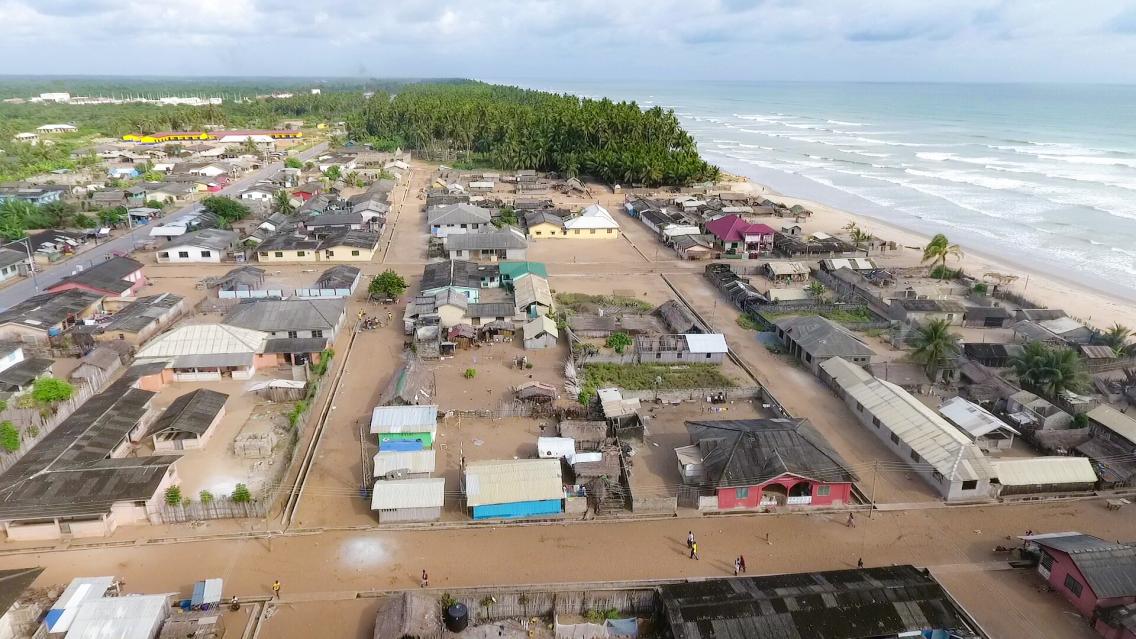
Colombia
In La Guajira in Colombia, a deep-rooted coal mining industry and nascent renewable energy projects intersect with the local indigenous Wayúu communities. Stakeholders taking part in the project emphasised the need for improved public access to project information. In the adjacent Cesar department, affected by shifts in demand for its coal resources, using the EITI to bring companies, governments and civil society together could provide a forum for communicating information and discussing transition policies.
Ghana
In Ghana’s Ellembelle District, communities have historically depended on farming and fishing, but have experienced change since the arrival of new oil and gas projects. While the industry has employed nationals and presented economic opportunities, members of the community expressed a need for granular information about employment, benefits and impact at the community level. Members also emphasised the need for more consultation and information about ongoing and future projects to help them plan ahead.
Indonesia
An uptick in the extraction of nickel, which is used in renewable energy technologies, is transforming local communities in North Morowali, Indonesia. Community members express concern over the lack of consultation and information regarding new nickel mines, emphasising the need for transparency, environmental monitoring and community engagement.
Supporting a gender-inclusive energy transition
The 2023 EITI Standard now includes strengthened reporting requirements on gender. As the global shift to net zero accelerates, addressing and mitigating gender disparities in the energy and extractive sectors has become a more urgent priority.
To support an inclusive transition, revised requirements include disclosures on company consultations and community consent; gender-specific benefits of extractive revenues to communities; more granular gender-disaggregated employment data; and environmental, social and gender impact assessments.
New guidance, published in October 2023, aims to clarify how the EITI Standard can support efforts for a more gender-diverse industry in the context of the energy transition by using data disclosed through the EITI.
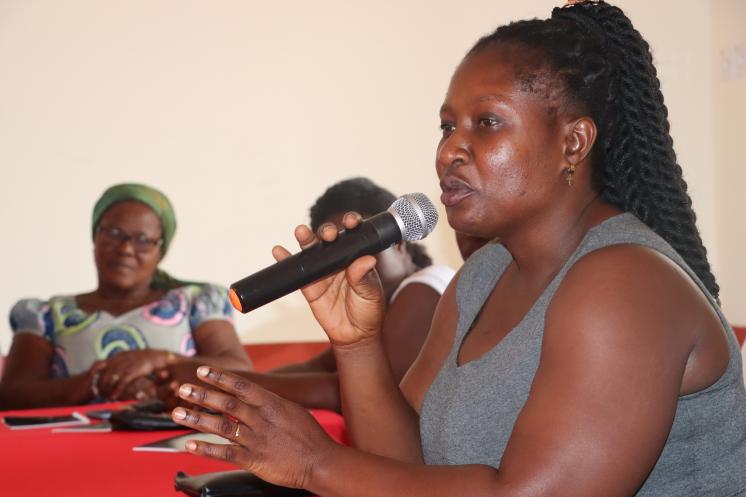
Supporting a gender-inclusive energy transition
- 131
- Estimated years it will take to achieve gender parity at the current pace.*
- 25%
- of members of EITI national multi-stakeholder groups are women.
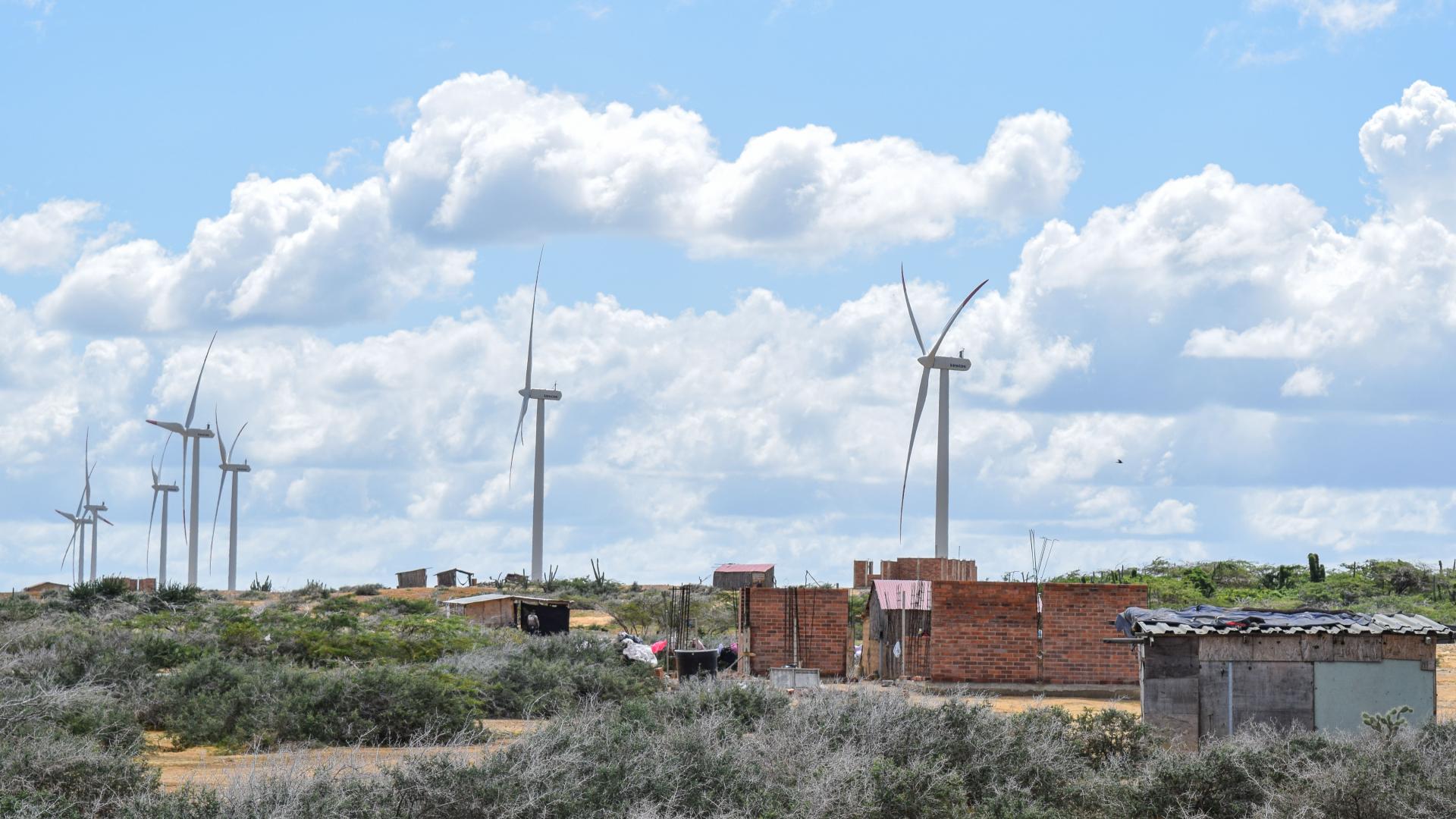
Shedding light on the renewables sector
The renewable energy sector is expanding rapidly in many countries. Large flows of financing, rapid scale-up in investment, and expectations of high returns can generate considerable governance risks. Mismanagement and corruption stand as potential barriers to the sector’s growth and to achieving the COP28 pledge to triple capacity by 2030.
The EITI commissioned research, published in November 2023, that outlines key risk areas for the sector, ranging from institutional and regulatory gaps and inadequate community engagement to project implementation and operational risks. The report draws on two decades of EITI implementation to offer insights and recommendations for stakeholders in the renewable energy industry.
In a collaborative effort at COP28, the EITI – alongside a group of companies, think tanks and civil society organisations – published a call to action urging greater transparency and accountability in the renewable energy sector.
Shedding light on the renewables sector
- USD 5 tr
- Estimated annual investment needed in the renewable energy sector to reach net zero goals by 2050.*
Pioneering transparency in the renewable energy sector
EITI reporting in various countries showcases pioneering efforts to promote transparency in the renewable energy sector. For instance, Germany’s EITI reporting provides contextual information about the country’s renewables sector, including market trends, information on subsidies, and an analysis of the sector’s economic contributions, including its impact on employment. In Mauritania, the EITI commissioned an analysis of the revenue potential of the green hydrogen sector. And in Trinidad and Tobago, the EITI has established an environmental subcommittee to oversee reporting on emissions, and the national gas company, NGC, became the first to disclose emissions data in a disaggregated manner thanks to EITI reporting.
Addressing corruption risks
Strengthening the EITI’s role in mitigating extractive sector corruption
New reporting provisions help EITI implementing countries identify and address corruption risks, and several countries are integrating anti-corruption measures in their activities.
These efforts align with a mandate from the EITI Board in 2020, which recognised the need for greater clarity on the EITI’s role in deterring corruption and support to multi-stakeholder groups in implementing anti-corruption measures, building on relevant disclosures such as those relating to beneficial owners and contracts.
For the first time, the 2023 EITI Standard explicitly reflects anti-corruption in the objectives and scope of several EITI Requirements. It includes provisions to help EITI implementing countries identify areas across the extractive sector value chain that are vulnerable to corruption. In addition, all EITI supporting and reporting companies are expected to disclose their anti-corruption policies. The new provisions primarily concern EITI Requirements 1.2, 1.4, 1.5, 2.1, 2.2, 2.5, 2.6, 6.1 and 7.1.
Using the EITI to identify and address corruption risks
Indonesia
In Indonesia, the EITI has taken proactive steps to address governance risks within the critical minerals supply chain, particularly concerning the battery industry. Through a dedicated focus group, the multi-stakeholder group commissioned a comprehensive study outlining risks and potential pitfalls. It is linking these efforts with Indonesia's national anti-corruption plan, showcasing a strategic alignment to combat corruption. It also conducted a study to identify how the EITI could provide support to existing anti-corruption initiatives.
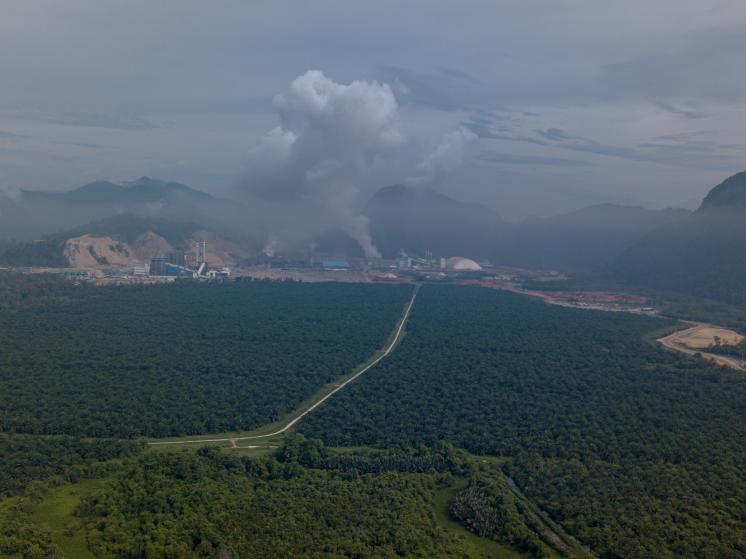
Philippines
Throughout 2022 and 2023, Philippine EITI (PH-EITI) conducted a thorough examination of corruption risks in the mining sector. Leveraging an anti-corruption tool developed by the Natural Resource Governance Institute (NRGI), PH-EITI prioritised a review of licensing processes in the large-scale nickel-mining sector, with the aim of preventing potential revenue leakages amid rising demand for nickel. The research uncovered 10 types of practices potentially undermining the integrity of license allocation mechanisms. PH-EITI is working on a plan to mitigate these risks, which includes advocacy for and coordination of specific policy and procedural changes with relevant government bodies and institutions.
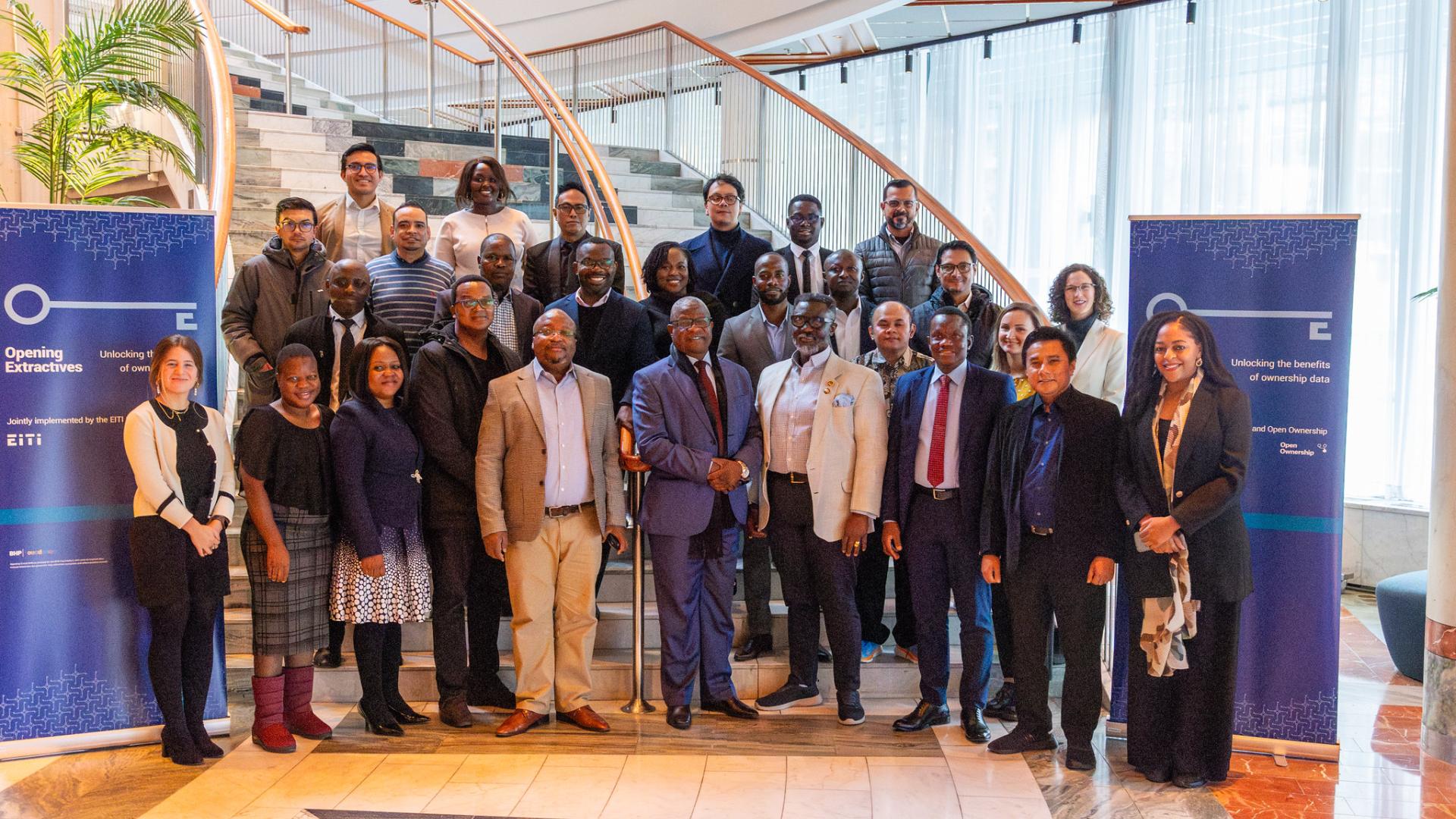
Accelerating the availability and use of beneficial ownership data
Beneficial ownership data serves as a critical tool in combatting corruption within the extractive sector, enabling the identification of conflicts of interest and corrupt practices. That is why the Opening Extractives programme, now midway through its five-year plan, will continue with its efforts to include beneficial ownership transparency in national agendas and facilitate the establishment of public registers. This collaborative initiative, led by the EITI and Open Ownership across 11 countries, aims to catalyse the availability and use of beneficial ownership data, serving as a model for broader global application.
A recent independent midterm evaluation of the programme, conducted by Oxford Insights, highlights significant progress made through Opening Extractives since the programme’s inception in 2021. The evaluation underscores impact in various areas such as raising awareness, enhancing government capacity, providing technical assistance and fostering peer learning.
Key achievements in 2023

Public registers
A new register in Liberia, launched in September 2023, will provide public oversight of ownership and control of extractive companies operating in the country. Nigeria is piloting a tool to identify high-risk areas, drawing on data from its forthcoming beneficial ownership register.
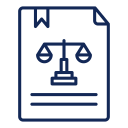
Legal frameworks
Ghana and Liberia have implemented new regulations mandating companies to disclose their beneficial owners, establishing crucial legal frameworks to promote transparency. Argentina drafted amendments to licensing regulations to include beneficial ownership disclosure.

Data collection
Armenia, Indonesia and Nigeria have reinforced their disclosure processes, facilitating efficient and structured data collection and verification procedures.

Data use
Workshops in Armenia, Ghana and Zambia convened and trained investigative journalists to use beneficial ownership data in evidence-based reporting on company ownership chains.
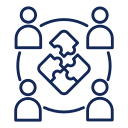
Capacity building
Targeted training in Argentina, Armenia, Indonesia, Liberia, Mongolia, the Philippines and Senegal, along with regional peer exchange events in Anglophone Africa and Latin America, have enhanced technical capacity among implementers and government officials. New guidance clarifies steps to ensure robust database design and data integrity.

Raising awareness
Engagement with media and civil society in Armenia, Liberia, Mongolia and Zambia has deepened citizens' understanding of the significance of accessible and timely beneficial ownership data.
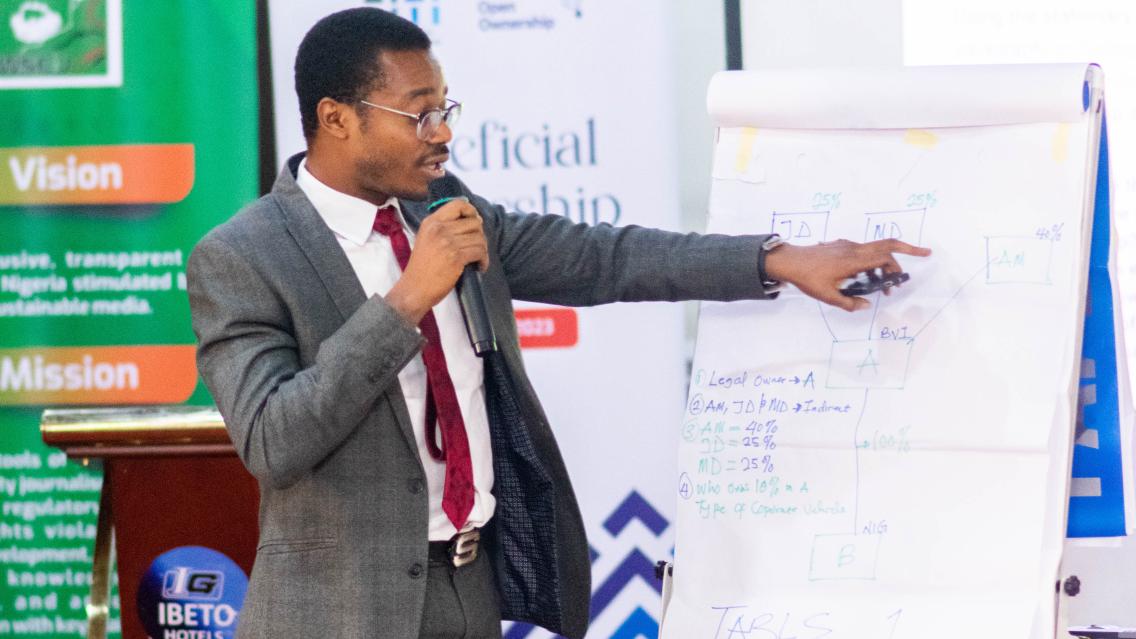
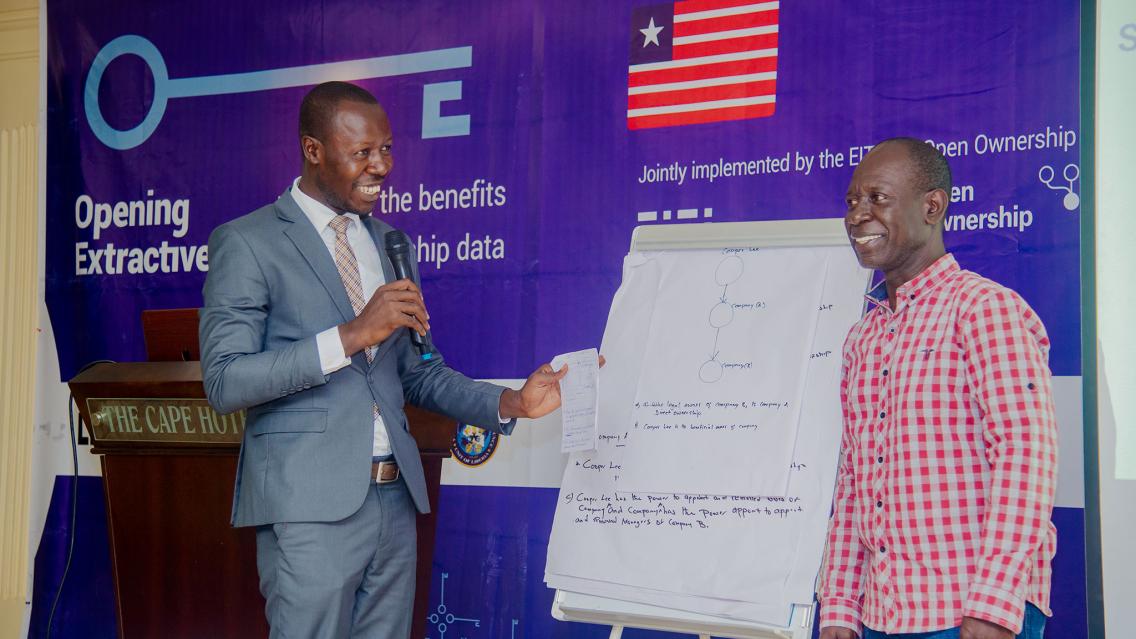
Taking stock of contract transparency
The EITI’s recent stock take identified that over 70% (41) of implementing countries disclose either all or some contracts, up from 37 countries in 2020. According to an analysis by NRGI, Oxfam and Publish What You Pay (PWYP), the number of EITI implementing countries disclosing at least one contract increased from 57% in 2017 to 70% in 2020. However, despite two-thirds of EITI countries having legislation permitting contract disclosure, progress has stagnated. Legal and institutional barriers persist in some countries, hindering the publication of full contracts.
As mining activities intensify to meet surging global demand for transition minerals, the imperative for public disclosure of mining agreements becomes increasingly evident. In November 2023, a white paper jointly published by ICMM and the EITI, assessed international commitments to contract transparency and evaluated the progress made by companies and governments in publishing mining agreements.
The findings reveal that among the 48 EITI implementing countries reporting on their mining sector, only 11 (23%) publish all or nearly all contracts, while 20 (42%) publish some mining contracts. Seventeen countries (35%) do not publish any mining contracts at all. Addressing these disparities will require concerted efforts to reduce disclosure gaps and ensure public access to the terms of all extractive agreements.
- 41
- EITI implementing countries disclose some or all extractive agreements.
Informing investment decisions
Supporting performance on environmental, social and governance indicators
Investment decisions in the extractive sector increasingly rely on environmental, social and governance (ESG) metrics. The EITI’s routine assessments of company adherence to its standards showcase significant improvements in corporate accountability practices.
These insights can play a crucial role in enhancing ESG performance and measurement, complementing other data published by companies and investors. Company support for the EITI can also contribute to broader governance and anti-corruption efforts, vital for minimising risks in investment. Through company participation in the EITI’s multi-stakeholder platform, companies and investors can leverage the EITI to understand and mitigate such risks.
Assessing company performance
In 2023, the EITI conducted a thorough assessment of 62 supporting companies, the second assessment of its kind since its introduction in 2021. The assessment gauges progress in meeting the Expectations for EITI supporting companies, offering insights on good practices and areas for improvement.
The latest assessment reveals a positive trajectory, with EITI supporting companies improving their performance across crucial aspects of corporate accountability. Most of these companies are meeting the majority of the Expectations and provide comprehensive disclosures in implementing countries, aligning with the EITI Standard and setting leading examples. Since the publication of the individual company results in June 2023, the EITI International Secretariat has engaged with numerous companies to encourage and identify opportunities for further progress.
Transparency of taxes and payments
In 2023, approximately 90% (52) of companies publicly disclosed taxes and payments in non-EITI implementing countries, up from 70% in 2021. Of the five remaining companies, three provided partial disclosures in some but not all non-EITI countries. Nearly 70% (39) of companies disclosed taxes and payments disaggregated by project in non-EITI countries.
Beneficial ownership of companies
Nearly all supporting companies disclose their beneficial owners, either directly or according to stock exchange regulations and listing requirements. However, there is significant progress to be made on statements endorsing beneficial ownership transparency, which are currently published by only 30% (18) of companies.
Due diligence processes and anti-corruption policies
Nearly all supporting companies have published an anti-corruption policy, in line with a new expectation introduced in 2022. However, the accessibility and consistency of these policies vary considerably. Few outline specifically how companies use beneficial ownership data in their due diligence processes regarding joint venture partners, contractors and suppliers. The EITI will issue clearer guidance on this expectation before the next assessment.
Contract transparency
Companies have made significant progress in advancing contract transparency since the initial assessment in 2021. By 2023, approximately 70% (43) of companies had published statements supporting contract transparency, largely driven by ICMM’s commitment for its member companies to disclose mineral development contracts entered into from January 2021.
Commodity trading transparency
Of the 12 supporting companies buying oil and gas resources from governments in EITI implementing countries, seven (58%) provided full disclosures of payments made to the state for trading activities, in line with the EITI’s reporting guidelines. As the EITI has yet to develop reporting guidelines for mineral trades, companies trading mineral resources were excluded from the assessment.
Gender diversity
Over 90% (58) of companies published policies on gender diversity. Yet these were often minimal or lacked clear diversity targets. Similarly, most companies disclosed employment data broken down by gender (59 of 62), however the comprehensiveness of these disclosures varied significantly. Companies were therefore encouraged to strengthen their policies and disclosures in this area.
Publishing open data
Making data more accessible, usable and timely
The EITI’s data strategy, launched in 2023 and spanning six years, envisions stronger support for countries to report quality data through government and company platforms in open format, as well as greater use of data to inform debate and dialogue.
These objectives aim to shift the focus from generating disclosures to supporting more impactful EITI implementation by making data more accessible and useful.
Community of practice
In November 2023, the EITI International Secretariat launched the EITI Data Use Community of Practice, a network of data practitioners from EITI implementing countries. The initiative aims to provide a platform to share experiences, innovations and good practices in using EITI disclosures for research and analysis, with the goal of informing public debate and policymaking on natural resource governance.
To date, the initiative has gathered more than 30 participants from 22 countries to exchange use cases that draw on company disclosures and data on state participation in the extractive sector. Best practices were shared on analysing data to identify discrepancies between oil sales prices and price benchmarks; track off-budget expenditures; and monitor whether revenues owed to local authorities were paid, among others.
The EITI International Secretariat is developing an online repository of data use cases, to be launched in 2024. This will provide stakeholders with examples of how data generated through the EITI can be analysed to inform and respond to key governance questions.
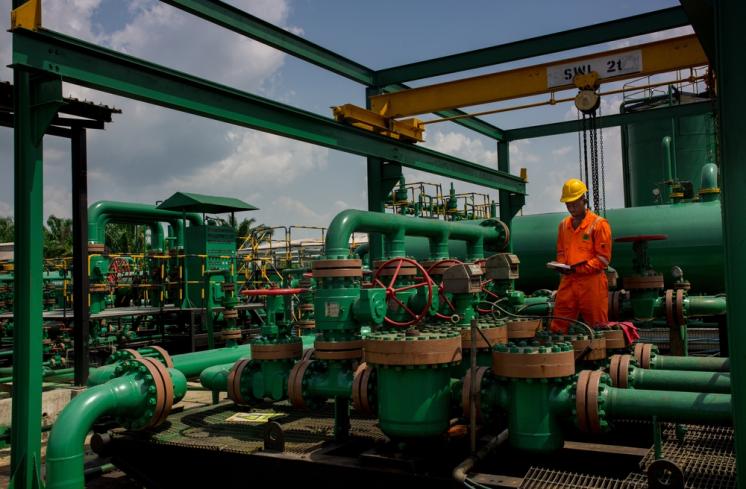
Data use case 1: Oil sales in Nigeria
The Nigerian government collects a significant share of oil and gas revenue in-kind as physical barrels of oil, which the national oil company, NNPC, is responsible for marketing and selling on the government’s behalf. However, there have been allegations in the past of oil being sold below market prices to politically exposed traders.
An analysis of EITI disclosures on Nigeria’s oil sales has shown that there are significant differences in the discount and premium on Brent oil prices depending on the type of sale (e.g. spot contract, term contract, resource-backed loan); the identity of the buyer; and the beneficiary government entity for the specific oil sale. The discount or premium on Brent does not seem to be consistent across different buyers or across time.
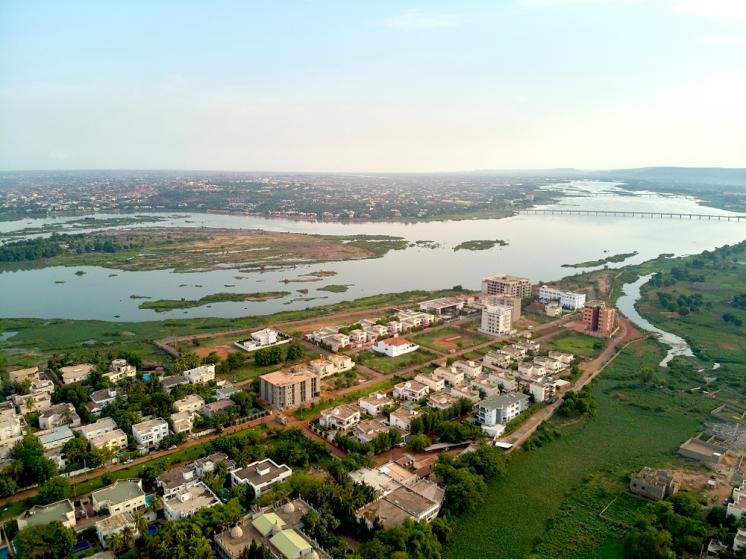
Data use case 2: License awards in Mali
Mali, Africa's third-largest gold producer, experienced a 23% increase in industrial gold production in 2018 due to new discoveries. From 2010 to 2022, around 1,700 exploration licenses were granted in the country.
The EITI International Secretariat analysed the time it takes for licenses to be awarded from the moment an application is submitted, using license data systematically disclosed by Mali's Ministry of Mines, Energy and Water.
The findings reveal a downward trend in the number of days taken by the government to award individual licenses. This may suggest improvements in the efficiency of licensing processes. However, it also raises concerns about vulnerabilities in the process, particularly in instances where licenses were apparently awarded before their applications. These insights can be used to enhance oversight of licensing processes and ensure they adhere to established protocols, promoting transparency and accountability in Mali's extractive sector.
Mapping company relationships
With support from Swiss government, work is underway to develop a relational database of state-owned enterprises (SOEs) participating in EITI reporting, drawing on existing disclosures of summary data submitted by implementing countries. To ensure interoperability and consistency in data analysis across different reporting periods, the database will use best practices on assigning unique identifiers to group SOE data over time. This will further enable linking between parent companies and their subsidiaries reporting in EITI countries.
The SOE database will further improve commodity trading transparency and enable users and analysts to quickly trend or aggregate disclosures over time. Moreover, the project will serve as a blueprint for developing similar databases in accordance with the EITI's strategy for catalysing the publication and use of open data.
Strengthening transparency at source
EITI implementing countries are increasingly disclosing data at source through government and company databases, online registries, websites and portals. Today, about a third of data reported through the EITI is disclosed systematically, allowing for multi-stakeholder groups to reduce reporting costs and shift their focus from data collection to data use, analysis and debate. Many countries have developed portals for reporting information such as beneficial owners, contracts and licenses, which centralise data collection and publication.
Strengthening domestic resource mobilisation
Using resources for sustainable development
Revenue from the extractive industries plays a vital role in funding national development and essential public projects, particularly during economic challenges and fluctuations in commodity prices.
The 2023 EITI Standard requires more robust disclosures, which can empower governments to optimise revenues for public welfare. Enhanced reporting on revenue streams and contractual terms enables countries to conduct in-depth analysis and financial projections, aiding in the effective management of past and projected revenues from the sector.
The 2023 EITI Standard now requires more comprehensive and detailed disclosures of company payments and government revenues from the extractive industries, which can help countries strengthen their tax base and raise revenues. The new provisions primarily concern EITI Requirements 2.4, 3.2, 3.3, 4.1, 4.2, 4.3, 4.9, 4.10 and 6.1.

Democratic Republic of the Congo
A 2021 study, commissioned by the EITI in the Democratic Republic of the Congo (ITIE-RDC), revealed that the Sicomines joint venture project deviated from its initial terms. Originally valued at USD 3 billion, the project involved Chinese investors constructing infrastructure in exchange for a 68% stake in a mining venture. However, ITIE-RDC’s study exposed several deviations: critical infrastructure projects remained unrealised, while an undisclosed 2017 contract amendment diverted profits to shareholders rather than reimbursing investments. Despite granting tax exemptions under the assumption of reimbursement, the project failed to meet its obligations.
Prompted by the report's findings, the government initiated renegotiations of the agreement in 2023. In January 2024, the DRC government announced that it successfully secured an additional USD 7 billion over 10 years through the renegotiated agreement with Chinese investors, marking a substantial increase from the original USD 3 billion deal. By leveraging the EITI framework, ITIE-RDC demonstrated the role it can play to strengthening revenue mobilisation, ensuring equitable resource distribution and fostering sustainable development.
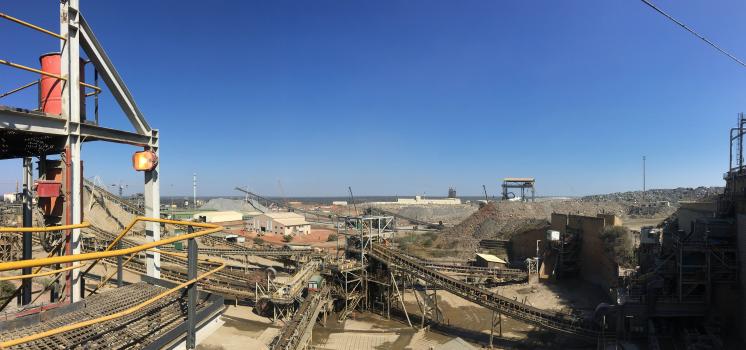
Zambia
Zambia’s latest EITI Report, published in 2023, shows a significant boost in tax contributions from the mining sector, despite lower overall copper production and prices. Mining taxes reached a record USD 1.9 billion – an 11% increase compared to the previous year, largely due to increased exports of copper. Reconciliation discrepancies, or gaps between what is paid by mining companies and reported as received by government agencies, were at an all-time low.
The great utility of Zambia EITI’s annual reports is that they are an independently verified set of facts that gives the public a transparent view of mining taxation – what has been paid on the one side and received on the other – and provides reassurance that the nation is recouping a very substantial return from the mining of its national resources.
Measuring impact
Monitoring outcomes from EITI implementation
Driving impact is key to sustain financial support and promote learning. To this end, the EITI is following up on recommendations from an independent evaluation, released in 2022, by providing support to multi-stakeholder groups to integrate monitoring, evaluation and learning into their work planning.
The EITI International Secretariat has also streamlined its key performance indicators and has committed to develop a measurement framework that can be adapted by implementing countries.
Key performance indicators
In 2023, the EITI Board agreed new key performance indicators to better track the EITI’s progress and impact globally. The framework was designed to function as an oversight and accountability tool, with performance indicators monitoring progress against the EITI International Secretariat’s work plan, Validation metrics, company engagement, satisfaction surveys, and performance of EITI implementing countries against global indicators, which cover areas such as civic space and foreign direct investment.
As the EITI’s quality assurance mechanism, Validation provides a valuable tool to monitor country progress against the EITI’s requirements over time, and to what extent countries address corrective actions and recommendations to improve implementation.
Moving forward, the International Secretariat plans to improve its data collection and tracking mechanisms to ensure data accuracy and measurement against relevant benchmarks where applicable.
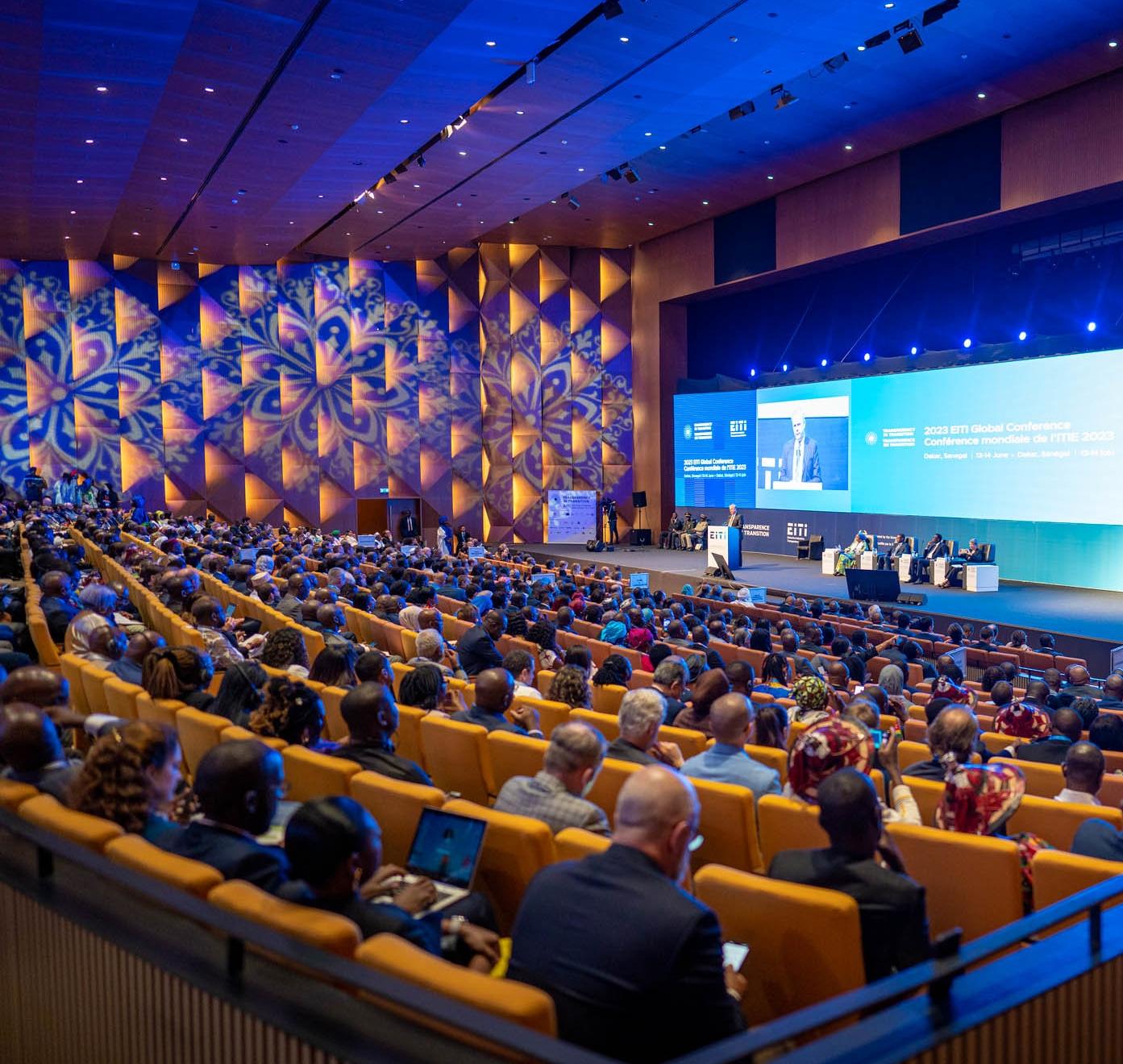
03 Operations
The EITI’s success depends on a strong network of stakeholders and partners, who provide funding and technical support to implementing countries, as well as funding to the EITI International Secretariat. The 2023 EITI Global Conference demonstrated the continued dedication of the EITI community to advancing transparency and accountability in natural resource governance worldwide.
EITI Global Conference
Transparency in transition
Marking the EITI’s 20th anniversary, the EITI Global Conference celebrated achievements in natural resource transparency and multi-stakeholder dialogue, while also looking to the future to consider how the EITI should adapt to a changing energy landscape and growing demand for an open and accountable resource sector.
Facilitating inclusive dialogue
The EITI Global Conference, held from 12-15 June 2023 in Senegal and hosted by the Government of Senegal, brought together over 1,300 stakeholders from more than 90 countries. Under the theme “Transparency in transition”, the gathering served as a platform for the EITI community to reconvene, share innovative approaches and best practices, enhance the organisation's visibility, and align EITI efforts with key themes, notably on the energy transition. As the first EITI Global Conference hosted in Africa, the event also presented an opportunity to convene stakeholders and highlight exemplary practices from the region.
Learn more about the EITI Global Conference
Promoting peer learning
Promoting peer learning was a key focus at the EITI Global Conference. During a dedicated peer learning day, government and civil society representatives discussed implementation challenges and solutions, shared reporting innovations, explored options for data use and highlighted examples of good communications practices. Additionally, the EITI Innovation Talks allowed implementing countries, companies, civil society organisations and partners to showcase innovative ideas for adhering to, and going beyond, the EITI Standard.
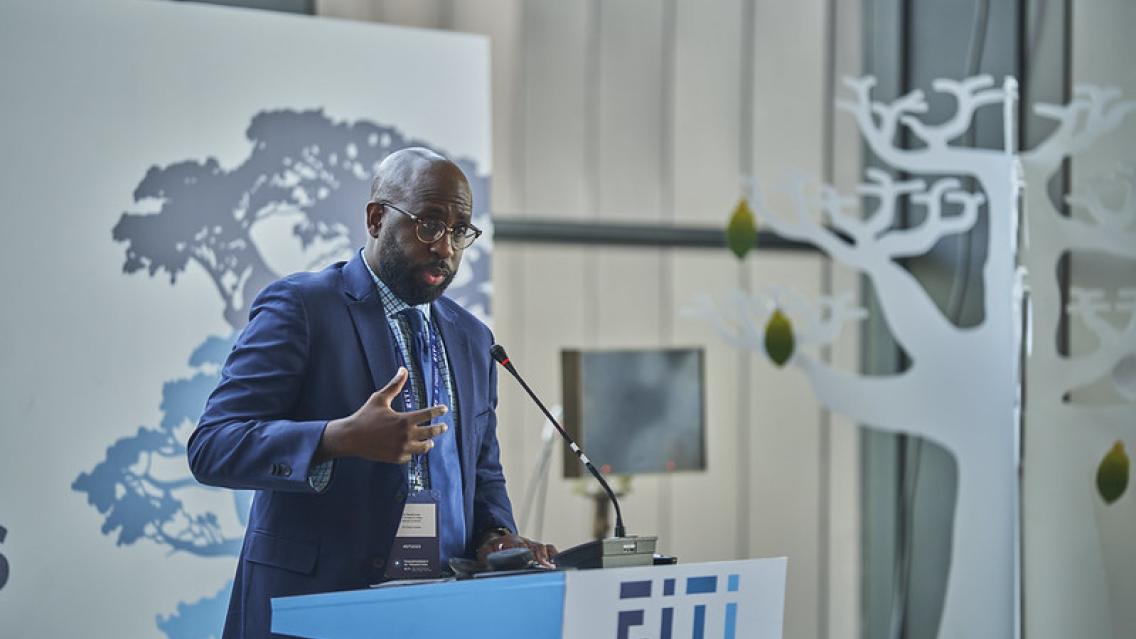
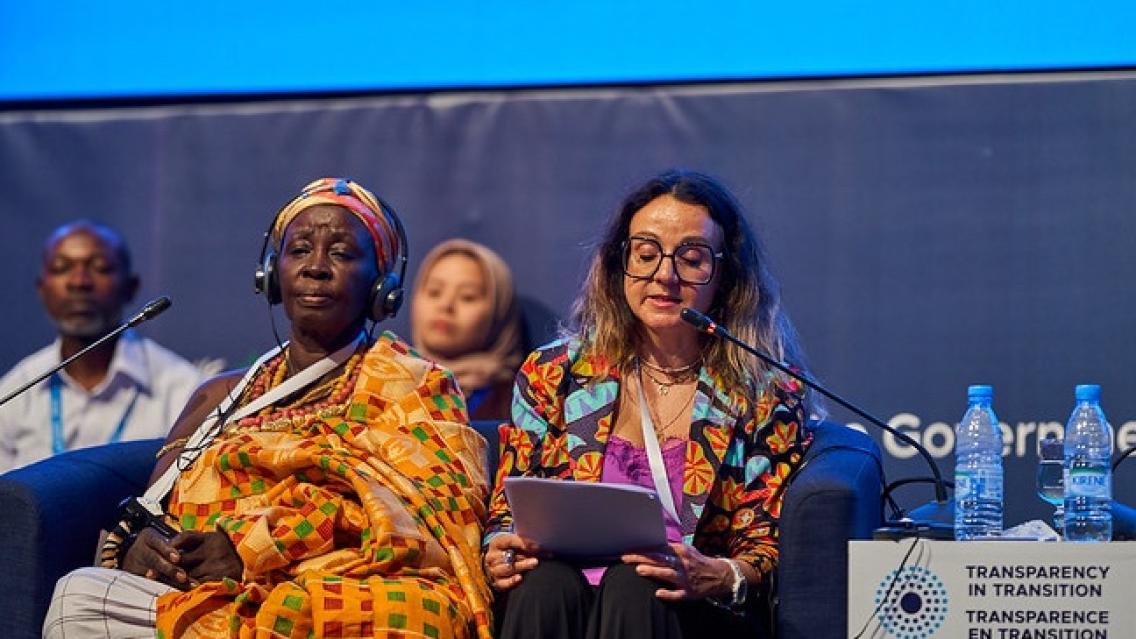
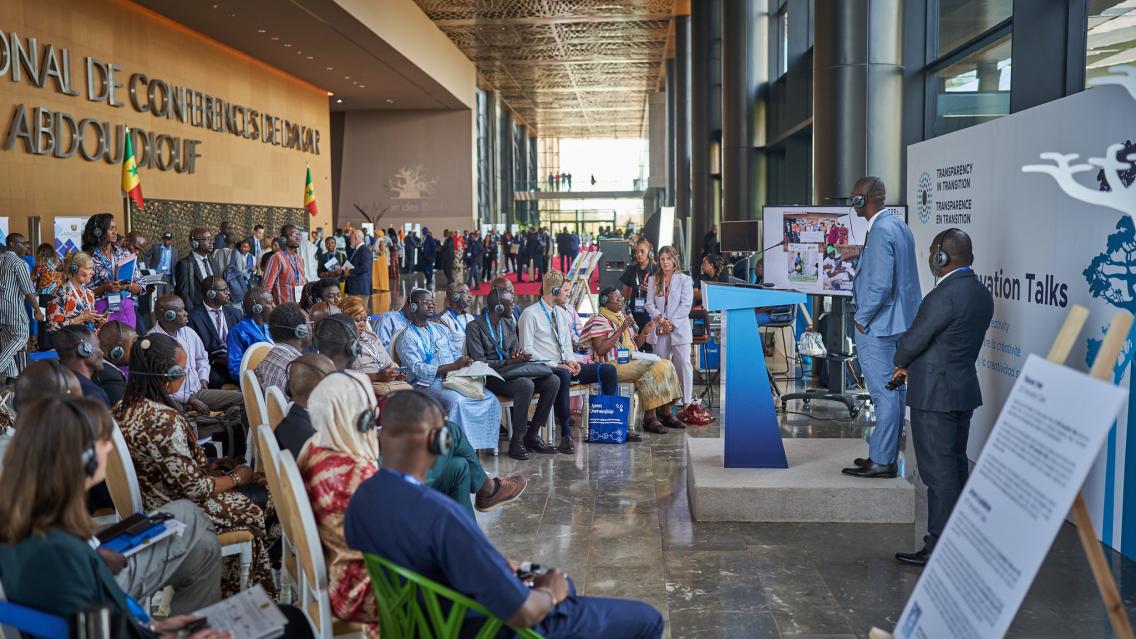
Delegate satisfaction
A survey of conference participants indicated a positive delegate experience, and nearly 85% of respondents agreed or strongly agreed that the conference objectives had been fulfilled. Furthermore, all respondents indicated a positive overall experience of the conference, as well as positive rankings on the relevance, quality and variety of conference sessions.
EITI International Secretariat
Supporting impactful EITI implementation
Headquartered in Oslo, Norway, the EITI International Secretariat is responsible for the functioning of the EITI Association and supports more than 50 countries in implementing the EITI Standard. Its work spans country support, policy, communications, data analysis and administration.
Supporting national secretariats and multi-stakeholder groups
Since the launch of the 2023 EITI Standard, the EITI International Secretariat has been dedicated to assisting implementing countries in understanding and adapting to the new provisions. In the second half of the year, it conducted training sessions through regional webinars and in-country missions, focusing on key areas such as work planning, energy transition, and reporting on environmental, social and gender issues. Capacity building efforts are ongoing on topics such as anti-corruption, beneficial ownership transparency and revenue collection, with updated guidance planned for release in 2024 to further support EITI implementation.
Feedback from a survey of 43 National Coordinators, who lead EITI national secretariats, has shown a generally high satisfaction level with the support provided by the International Secretariat, especially in terms in responsiveness and assistance with procedural and operational matters, including preparation for Validation. Nevertheless, there remain opportunities to strengthen support and capacity building on thematic and policy priorities, EITI reporting and work planning.
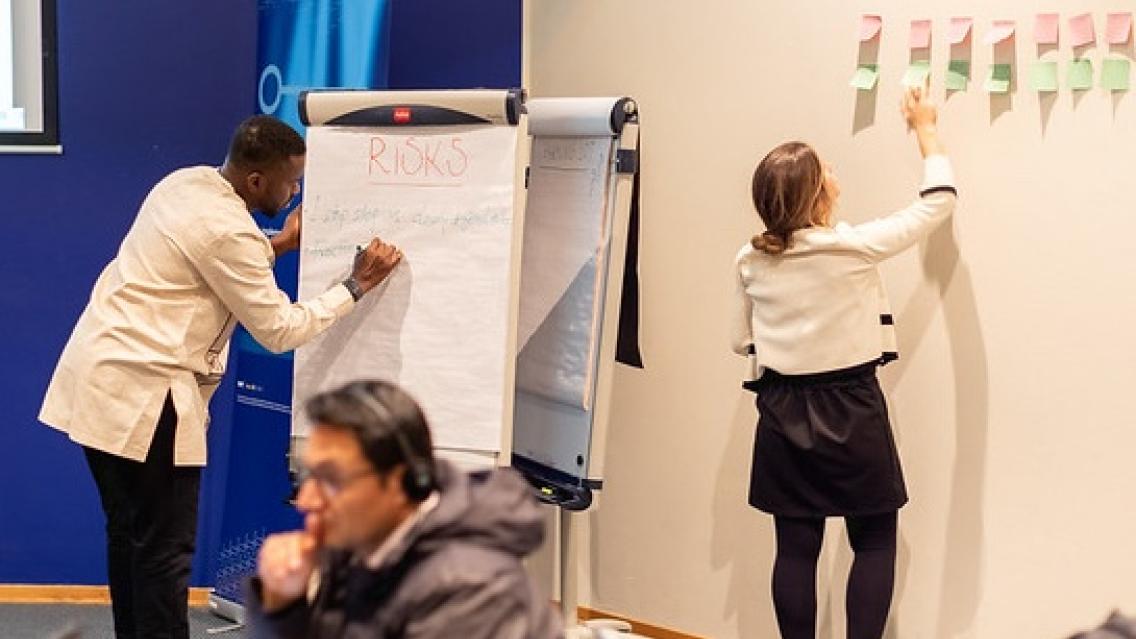
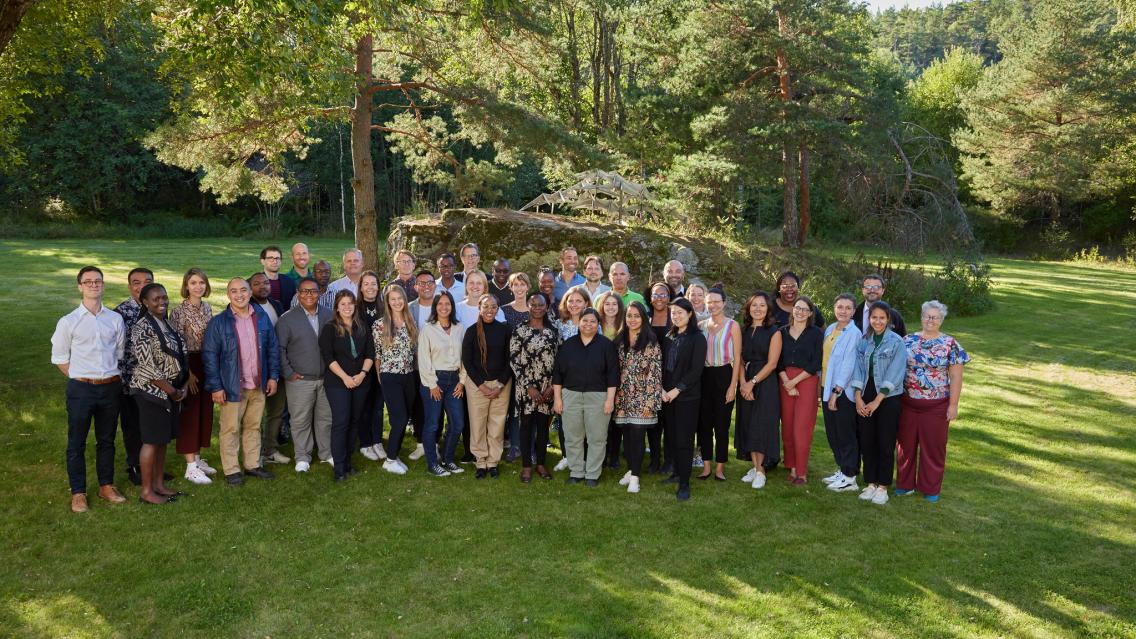
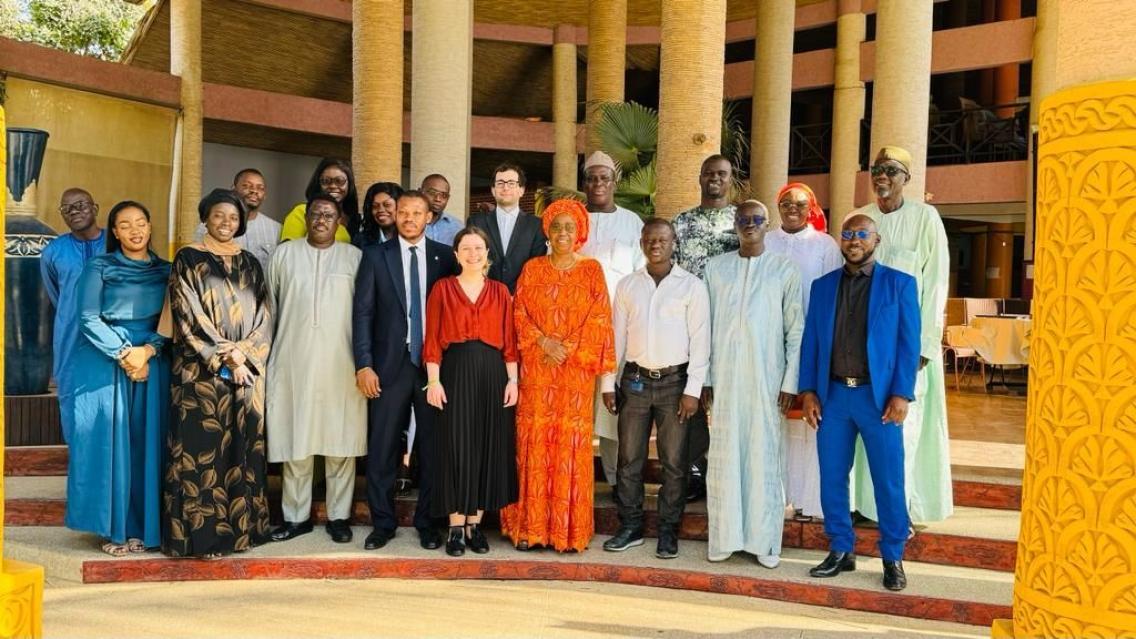
Promoting staff diversity and gender balance
The EITI International Secretariat is an equal opportunities employer and is committed to achieving diversity in terms of gender, nationality, culture and educational background. The International Secretariat’s organisational culture is underpinned by values of integrity, professionalism and respect for diversity. Representing over 25 countries, staff bring diverse backgrounds, cultures, perspectives and languages, which drive innovation and progress.
Efforts are currently underway to implement a comprehensive strategy on diversity, equity, inclusion and belonging (DEIB), which includes training for all staff members.
Supporting the EITI Board
The EITI International Secretariat supports the EITI Board and its committees through preparation of papers, facilitation of meetings and capacity building of Board members. In 2023, the EITI Board and its committees demonstrated effective functioning through timely decisions, particularly on revisions to the EITI Standard. Board committees were actively engaged, evidenced by the number of meetings and papers reviewed in line with their respective mandates. The 2023-2026 EITI Board was elected in June 2023.
Learn more about the EITI Board See all Board decisions
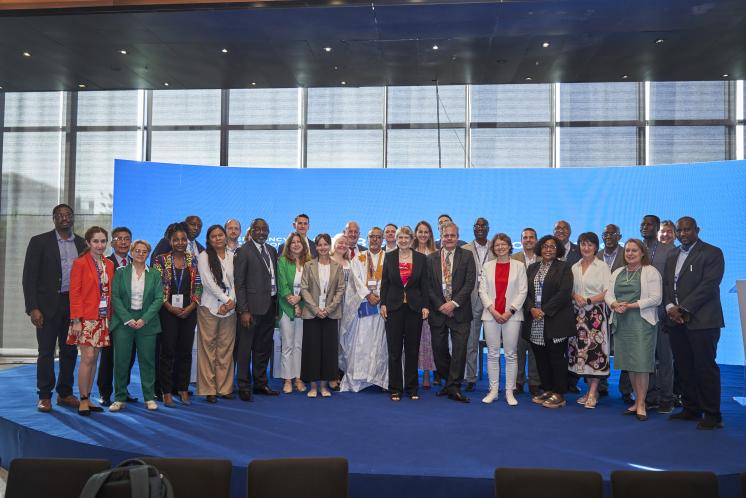
| 2023 activities | # of meetings | # papers for discussion | # papers for decision | Effectiveness** |
|---|---|---|---|---|
| EITI Board | 5* | 47 | 20 | 42% |
| Finance Committee | 8 | 20 | 6 | 30% |
| Governance and Oversight Committee | 12 | 35 | 19 | 54% |
| Implementation Committee | 13 | 42 | 18 | 43% |
| Outreach and Candidature Committee | 4 | 12 | 5 | 42% |
| Rapid Response Committee | 2 | 2 | 2 | 100% |
| Validation Committee | 11 | 50 | 33 | 66% |
**The effectiveness indicator represents the total number of Board or committee papers resulting in a decision. Not all papers result in a decision, as many undergo several iterations or are for information only.
Funding and support
The funding of the EITI International Secretariat reflects multi-stakeholder support from governments in implementing and supporting countries and over 60 supporting companies.
The International Secretariat also receives project-specific funding, including from various foundations, to advance and scale priority policy areas, such as beneficial ownership transparency, anti-corruption, energy transition, commodity trading transparency and community engagement.
The EITI is also grateful for the considerable investments of time and advice from civil society groups, government representatives, partners and companies. While not reflected in the budget, these contributions are essential to achieve the EITI’s mission.
Financial management
In 2023, the EITI International Secretariat achieved efficient and prudent financial management by maintaining expenditures below budget and in line with revenues. Efforts were made to adhere to target levels for management and overhead costs, and cost cutting measures were implemented while preserving quality of work, both on Validation and support to implementation, to achieve a modest surplus for the year.
Supporters
We are grateful for the steadfast support from our donors, in particular from our supporting countries and foundations for their core multi-year and project grants:
All information herein is from the EITI unless otherwise indicated and is current as of 31 December 2023. Cover photo: Shutterstock.

